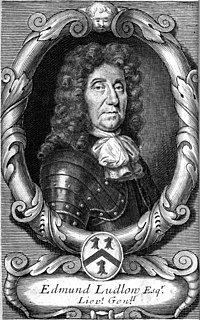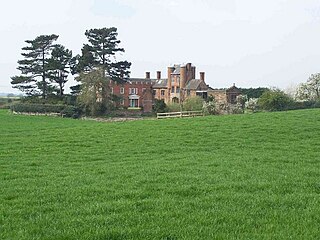Related Research Articles

Edmund Ludlow was an English parliamentarian, best known for his involvement in the execution of Charles I, and for his Memoirs, which were published posthumously in a rewritten form and which have become a major source for historians of the Wars of the Three Kingdoms. Ludlow was elected a Member of the Long Parliament and served in the Parliamentary armies during the English Civil Wars. After the establishment of the Commonwealth in 1649 he was made second-in-command of Parliament's forces in Ireland, before breaking with Oliver Cromwell over the establishment of the Protectorate. After the Restoration Ludlow went into exile in Switzerland, where he spent much of the rest of his life. Ludlow himself spelled his name Ludlowe.

Sir Richard Fanshawe, 1st Baronet PC was an English poet and translator. He was a diplomat and politician who sat in the House of Commons from 1661 to 1666. During the English Civil War he supported the Royalist cause and served King Charles II in battle and in exile.

Sir Orlando Bridgeman, 1st Baronet, SL was an English common law jurist, lawyer, and politician who sat in the House of Commons from 1640 to 1642. He supported the Royalist cause in the English Civil War.

The Barons of the Exchequer, or barones scaccarii, were the judges of the English court known as the Exchequer of Pleas. The Barons consisted of a Chief Baron of the Exchequer and several puisne (inferior) barons. When Robert Shute was appointed second baron in June 1579 the patent declared "he shall be reputed and be of the same order, rank, estimation, dignity and pre-eminence to all intents and purposes as any puisne judge of either of the two other courts." The rise of commercial trade in Elizabethan England occasioned fraudulent application of the Quo minus writ. More taxation demanded staff at the exchequer to sift an increase in the case load causing more widespread litigation cases to come to the court. From the 1580s onwards the Barons of Exchequer were no longer held in such low regard, and more likely to be Serjeants-at-law before qualification. The Inns of Courts began to exclude solicitors, and held posts for judges and barons open equally to barristers. In 1591, Regulations reflected a case in which the Lord Keeper Egerton banned solicitors from seeking cases in the Exchequer.

John Finch, 1st Baron Finch was an English judge, and politician who sat in the House of Commons at various times between 1621 and 1629. He was Speaker of the House of Commons.
Roger Hill, of Poundisford Parkin Somerset, was an English judge and Member of Parliament.
Sir Richard Richards was a Welsh politician and judge. He was Member of Parliament for Helston on two occasions, but only made one speech in Parliament. He was later a successful chancery barrister, eventually becoming Lord Chief Baron of the Exchequer.

Sir Edward Littleton, 1st Baronet was a 17th-century English Baronet and politician from the extended Littleton/Lyttelton family, the first of a line of four Littleton baronets with Pillaton Hall as their seat. He initially joined the Parliamentarians during the English Civil War. Having tried unsuccessfully to find a third way, he switched his support to the Royalist cause – a decision that led to his financial ruin, as large debts made it impossible to redeem his estates from sequestration after the victory of Parliament.
John Wilde was an English lawyer and politician. As a serjeant-at-law he was referred to as Serjeant Wilde before he was appointed judge. He was a judge, chief baron of the exchequer, and member of the Council of State of the Commonwealth period.
Sir Thomas Trevor was an English lawyer, judge and Member of Parliament, most notable for having delivered the judgment against John Hampden in the Ship Money case.
Sir Edward Atkyns SL (1587–1669) was an English judge, a baron of the exchequer of the Commonwealth period.
Sir Richard Lane, a.k.a. Edward Lane, was an English barrister who practised mostly in the Court of Exchequer. He acted as defence counsel to the Earl of Strafford when the Earl was impeached and attainted, and also represented Archbishop Williams and eleven other bishops who were imprisoned in the Tower of London in 1642.
Edward Thurland was an English lawyer and politician who sat in the House of Commons at various times between 1640 and 1673.
Sir Timothy Littleton was an English judge and politician who sat in the House of Commons between 1660 and 1670.
Richard Wallop (1616–1697) was an English judge.
Tomlins may refer to:
Richard Tomlins or Tomlyns was an English politician who sat in the House of Commons between 1621 and 1629. He was made an honorary member of Lincoln's Inn in 1625.

Sir Edward Bromley was an English lawyer, judge, landowner and politician of the Elizabethan and Jacobean periods. A member of a Shropshire legal and landed gentry dynasty, he was prominent at the Inner Temple and became a Baron of the Exchequer. He was elected MP for Bridgnorth on six consecutive occasions.
John Sotherton the younger (1562–1631) was an English judge, member of a prominent parliamentary, judicial and mercantile family of London and East Anglia, who became Cursitor Baron of the Exchequer in 1610.
Richard Tomlins may refer to:
References
- 1 2 Foss, Edward (1857). The Judges of England. p. 495. Retrieved 2 January 2017.
- ↑ Students admitted to the Inner Temple
- ↑ "TOMLYNS, Richard (1563-1650), of Broad Sanctuary, Westminster Abbey; later of Richmond, Surr. | History of Parliament Online".